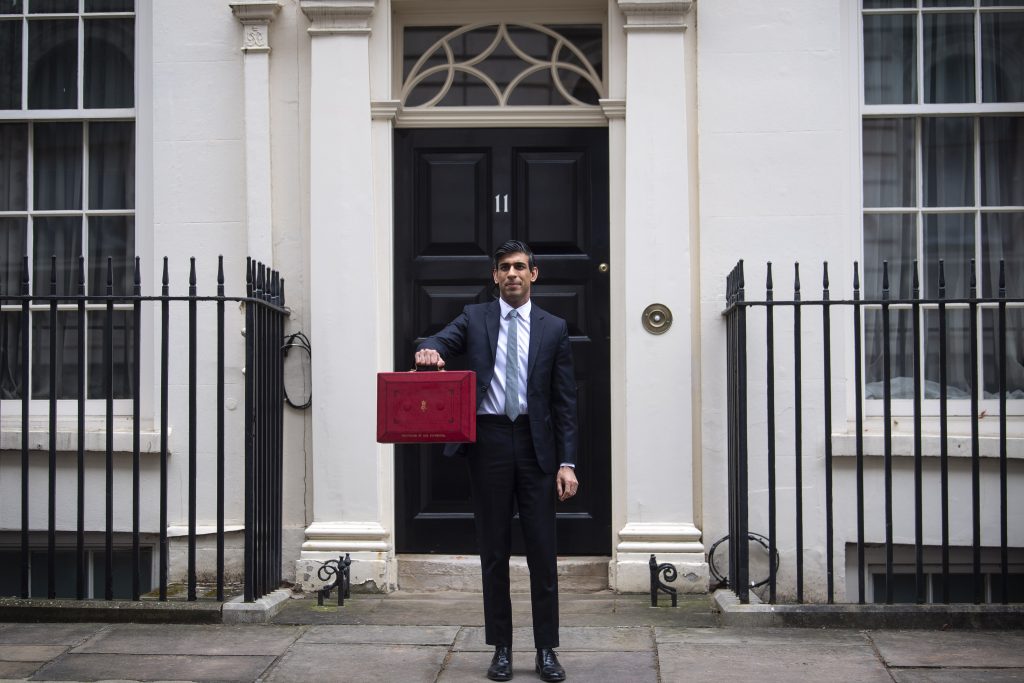// Chancellor announces extension of business rates holiday until June, with discount scheme for the rest of the year
// Non-essential retailers can access a “new restart grant” of £6000 per premises for when they reopen mid-April
// Corporation tax to rise from 19% to 25% in 2023, although this will only affect retailers with profits of £250,000 or greater
Chancellor Rishi Sunak has confirmed an extension to the business rates holiday and furlough scheme, as well as new £6000 “restart” grants for non-essential retailers, as part of his Budget announcement today.
Speaking to the House of Commons this afternoon, Sunak said the 100 per cent business rates holiday would be extended until the end of June for hard-hit retailers and hospitality and leisure firms that operate premises on high streets, shopping centres and retail parks.
Sunak added that for the remaining nine months of the tax year, business rates would still be discounted by two-thirds, up to a value of £2 million for closed businesses, with a lower cap for those who have been able to stay open during lockdowns due to “essential” status.
READ MORE:
- Furlough scheme to be extended until end of September
- Rishi Sunak to support small businesses with Help to Grow scheme
- What would an “Amazon tax” mean for UK retail?
The Chancellor said this equated to “a £6 billion tax cut for business”.
The business rates holiday – aimed at lifting the burden on retailers and other high street businesses that have been adversely impacted by the Covid-19 pandemic, especially the lockdowns – had originally been due to expire at the one year-mark in April.
Sunak also confirmed the furlough scheme would be extended until the end of September, and employees will continue to receive 80 per cent of their salary for hours not worked.
“As businesses reopen, we’ll ask them to contribute alongside the taxpayer to the cost of paying their employees,” he told MPs.
“Nothing will change until July, when we will ask for a small contribution of just 10 per cent and 20 per cent in August and September.”
Also confirmed in the Budget was a “new restart grant” that would be provided in April to help businesses reopen as the phased lockdown exit plan ramps up in mid-April.
Sunak said that because non-essential retailers were due to reopen first, they would receive grants of up to £6000 per premises.
Other high street businesses, such as hospitality and leisure businesses and close-contact services, would be given grants of up to £18,000 per premises.
“That’s £5 billion of new grants, on top of the £20 billion we’ve already provided,” Sunak told the Commons.

The Chancellor also set out a new Recovery Loan Scheme to replace previous Covid-19 loan packages, allowing businesses of any size to apply for loans from £25,000 up to £10 million until the end of the year, with the UK Government providing lenders with an 80 per cent guarantee.
Sunak said retailers and other businesses would still need loans to see them through despite the restart grants.
“As the Bounce Back Loan and CBIL schemes come to an end, we’re introducing a new recovery loan scheme to take their place,” he said.
“Businesses of any size can apply for loans from £25,000 up to £10 million, through to the end of this year.
Meanwhile, the corporation tax is set to rise from 19 per cent to 25 per cent in 2023.
However, a new “small profits rate” will maintain the 19 per cent rate for businesses with profits of £50,000 or less – meaning around 70 per cent of companies – 1.4 million businesses, many of which are retailers – would be “completely unaffected” by the tax hike.
Sunak said there would be a taper above £50,000, so that only businesses with profits of £250,000 or greater would be taxed at the full 25 per cent rate. This equated to around 10 per cent of firms.
“So yes, it’s a tax rise on company profits,” Sunak said.
“But only on the larger, most profitable companies. And only in two years’ time.”
Sunak added there would be a “super deduction” for companies when they invest, reducing their tax bill by 130 per cent of the cost.
For those in retail who are self-employed, they will continue being able to access support until September, with the fourth grant providing three months of support at 80 per cent of average trading profits.
Sunak said that for the fifth grant covering the three month period until September, self-employed workers will continue to receive grants worth three months of average profits, and that claims can be made from late July.
The Budget also confirmed that the minimum wage would increase to £8.91 an hour from April.
On apprenticeships, the Chancellor said: “I’m doubling the incentive payments we give businesses to £3000 – that’s for all new hires, of any age.”
Retailers will be able to benefit from a new “Help to Grow” scheme to be rolled out across the UK, which is aimed at offering access to management training and to provide online training to businesses that need it.
Finally, Sunak confirmed there would be more than £1 billion for 45 new towns deals.
“We’re creating a £150 million fund to help communities across the UK take ownership of pubs, theatres, shops, or local sports clubs at risk of loss – putting more power in the hands of local people,” he said.
Sunak’s Budget speech made no mention of an online sales tax – also known as the “Amazon tax” – despite speculation in recent weeks that he would do so.
Click here to sign up to Retail Gazette‘s free daily email newsletter
















